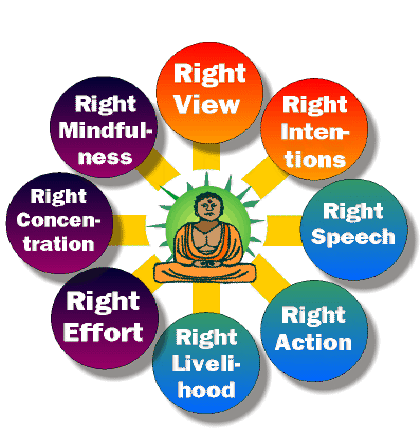Buddhism and the Four Noble Truths
Roughly 2500 years ago a man named Siddhartha Guatama started down a spiritual path that would eventually inspire countless people to follow in his footsteps. Around 563 BC there was a very wealthy and privileged prince from northern India. He had never truly seen the outside world. One night he decided to leave behind his wife of many years and newly born son. He saw for the first time in his life people suffering, people dying. Perplexed by this he started on a very long journey, a quest to understand suffering and happiness, that eventually led to his enlightenment and the foundations of a new religion.
After reaching a state of enlightenment Siddhartha taught of Four Noble Truths. This wisdom conveyed a reality that if accepted produces positive psychological and spiritual growth. The First Noble Truth states that there is suffering. We are under the illusion that things are better than they truly are. The realization and acceptance of the fact that suffering exists motivates following the path of Buddhisim.
The Second Noble Truth is the origin of suffering. The origin of suffering is linked to attachment, to a craving of a desire. This teaching finds the root or cause of suffering to therefore lie within the individual and not in external circumstances.
The Third Noble Truth is the end of suffering. Because a craving is the cause of suffering, ending the craving will end the suffering. Buddhism teaches that detachment is the key to end all suffering. This includes both material goods as well as a sense of possessiveness of other people, although is doesn’t mean that we shouldn’t love others.
The Fourth Noble Truth is called the Eightfold Path. It is a step by step process, or the method for achieving an end of suffering. It is also referred to as the Middle Way because it avoids the extremes of either self-indulgence or self-mortification. Its focus is right intention, speech, action, livelihood, effort, mindfullness, and right concentration.

All individuals shoud strive towards a goal of happiness. The Dalai Lama, the most proficient follower of the Four Noble Truths as well as the rest of Buddhist practices, says that happiness is the natural consequesnce of following the right spiritual path. The ultimate purpose for these Noble Truths is to end suffering, which in turn allows for true happiness. Momentary pleasures should not be the focus because they usually come with prolonged consequences, but a lasting happiness called sukha. It requires dedication and practice, following the Eightfold Path. Learning the right way to see and accept the world. To not judge it but to be a part of it. Once we have become detached from our worldly desires we are no longer tied to things that will ultimately disappoint us. With a truer understanding of reality comes a wisdom that allows for better choices, Buddhism provides a path for learning the true nature of things. No longer will the delusions and illusions of this world cloud our understanding and cause suffering. There is a way of happiness..

































No comments:
Post a Comment